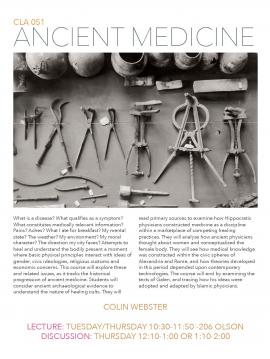 Classics 051. Ancient Medicine (4 units)
Classics 051. Ancient Medicine (4 units)
Colin Webster
| Disc. Sec. | Disc. Lead | Day/Time | Room | CRN |
| 01 | TBA | R 1:10-2:00P | 27 Wellman Hall | 54616 |
| 02 | TBA | R 3:10-4:00P | 1116 Hart Hall | 54617 |
| 03 | TBA | R 4:10-5:00P | 1116 Hart Hall | 54618 |
| 04 | TBA | R 5:10-6:00P | 1116 Hart Hall | 54619 |
Course Description: What is a disease? What qualifies as a symptom? What constitutes medically relevant information? Pains? Aches? What I ate for breakfast? My mental state? The weather? My environment? My moral character? The direction my city faces? Attempts to heal and understand the bodily present a moment where basic physical principles interact with ideas of gender, civic ideologies, religious customs and economic concerns. This course will explore these and related issues, as it tracks the historical progression of ancient medicine. Students will consider ancient archaeological evidence to understand the nature of healing cults. They will read primary sources to examine how Hippocratic physicians constructed medicine as a discipline within a marketplace of competing healing practices. They will analyze how ancient physicians thought about women and conceptualized the female body. They will see how medical knowledge was constructed within the civic spheres of Alexandria and Rome, and how theories developed in this period depended upon contemporary technologies. The course will end by examining the texts of Galen, and tracing how his ideas were adopted and adapted by Islamic physicians.
Prerequisite: None.
GE credit (New): Arts & Humanities, World Cultures and Writing Experience.
Format: Lecture - 3 hours; Discussion - 1 hour.
